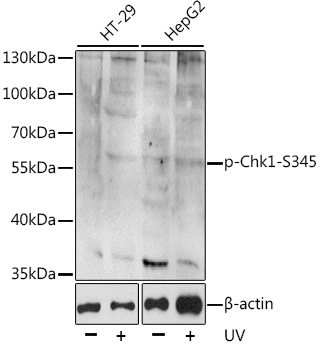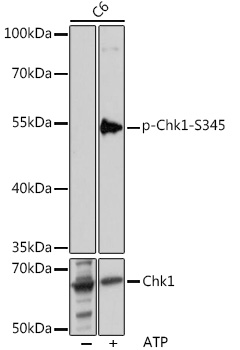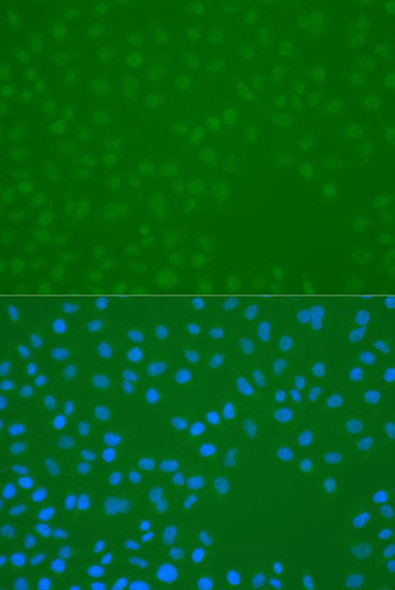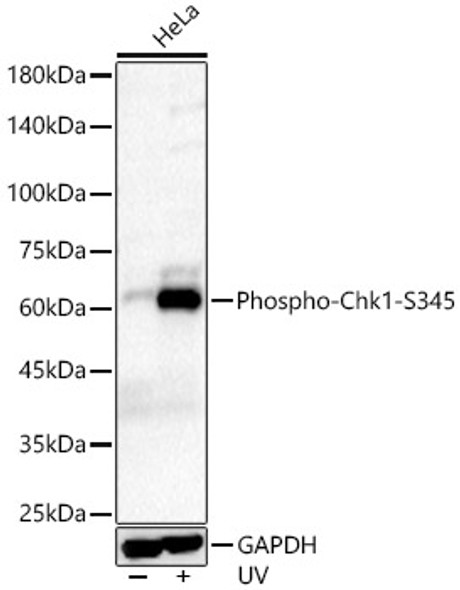Cell Cycle Antibodies 2
Anti-Phospho-CHEK1-S345 Antibody (CABP0578)
- SKU:
- CABP0578
- Product Type:
- Antibody
- Applications:
- WB
- Reactivity:
- Human
- Host Species:
- Rabbit
- Isotype:
- IgG
- Research Area:
- Cell Cycle
Description
| Antibody Name: | Anti-Phospho-CHEK1-S345 Antibody |
| Antibody SKU: | CABP0578 |
| Antibody Size: | 20uL, 50uL, 100uL |
| Application: | WB |
| Reactivity: | Human, Mouse, Rat |
| Host Species: | Rabbit |
| Immunogen: | A synthetic phosphorylated peptide around S345 of human Chk1 (NP_001265.2). |
| Application: | WB |
| Recommended Dilution: | WB 1:500 - 1:2000 |
| Reactivity: | Human, Mouse, Rat |
| Positive Samples: | HT-29, HepG2, C6 |
| Immunogen: | A synthetic phosphorylated peptide around S345 of human Chk1 (NP_001265.2). |
| Purification Method: | Affinity purification |
| Storage Buffer: | Store at -20°C. Avoid freeze / thaw cycles. Buffer: PBS with 0.02% sodium azide, 50% glycerol, pH7.3. |
| Isotype: | IgG |
| Sequence: | SFSQ P |
| Gene ID: | 1111 |
| Uniprot: | O14757 |
| Cellular Location: | Cytoplasm, Nucleus, centrosome, cytoskeleton, microtubule organizing center |
| Calculated MW: | 43kDa/50kDa/54kDa |
| Observed MW: | 54kDa |
| Synonyms: | CHEK1, CHK1 |
| Background: | The protein encoded by this gene belongs to the Ser/Thr protein kinase family. It is required for checkpoint mediated cell cycle arrest in response to DNA damage or the presence of unreplicated DNA. This protein acts to integrate signals from ATM and ATR, two cell cycle proteins involved in DNA damage responses, that also associate with chromatin in meiotic prophase I. Phosphorylation of CDC25A protein phosphatase by this protein is required for cells to delay cell cycle progression in response to double-strand DNA breaks. Several alternatively spliced transcript variants have been found for this gene. |
| UniProt Protein Function: | Serine/threonine-protein kinase which is required for checkpoint-mediated cell cycle arrest and activation of DNA repair in response to the presence of DNA damage or unreplicated DNA. May also negatively regulate cell cycle progression during unperturbed cell cycles. This regulation is achieved by a number of mechanisms that together help to preserve the integrity of the genome. Recognizes the substrate consensus sequence [R-X-X-S/T]. Binds to and phosphorylates CDC25A, CDC25B and CDC25C. Phosphorylation of CDC25A at 'Ser-178' and 'Thr-507' and phosphorylation of CDC25C at 'Ser-216' creates binding sites for 14-3-3 proteins which inhibit CDC25A and CDC25C. Phosphorylation of CDC25A at 'Ser-76', 'Ser-124', 'Ser-178', 'Ser-279' and 'Ser-293' promotes proteolysis of CDC25A. Phosphorylation of CDC25A at 'Ser-76' primes the protein for subsequent phosphorylation at 'Ser-79', 'Ser-82' and 'Ser-88' by NEK11, which is required for polyubiquitination and degradation of CDCD25A. Inhibition of CDC25 leads to increased inhibitory tyrosine phosphorylation of CDK-cyclin complexes and blocks cell cycle progression. Also phosphorylates NEK6. Binds to and phosphorylates RAD51 at 'Thr-309', which promotes the release of RAD51 from BRCA2 and enhances the association of RAD51 with chromatin, thereby promoting DNA repair by homologous recombination. Phosphorylates multiple sites within the C-terminus of TP53, which promotes activation of TP53 by acetylation and promotes cell cycle arrest and suppression of cellular proliferation. Also promotes repair of DNA cross-links through phosphorylation of FANCE. Binds to and phosphorylates TLK1 at 'Ser-743', which prevents the TLK1-dependent phosphorylation of the chromatin assembly factor ASF1A. This may enhance chromatin assembly both in the presence or absence of DNA damage. May also play a role in replication fork maintenance through regulation of PCNA. May regulate the transcription of genes that regulate cell-cycle progression through the phosphorylation of histones. Phosphorylates histone H3.1 (to form H3T11ph), which leads to epigenetic inhibition of a subset of genes. May also phosphorylate RB1 to promote its interaction with the E2F family of transcription factors and subsequent cell cycle arrest. |
| NCBI Summary: | The protein encoded by this gene belongs to the Ser/Thr protein kinase family. It is required for checkpoint mediated cell cycle arrest in response to DNA damage or the presence of unreplicated DNA. This protein acts to integrate signals from ATM and ATR, two cell cycle proteins involved in DNA damage responses, that also associate with chromatin in meiotic prophase I. Phosphorylation of CDC25A protein phosphatase by this protein is required for cells to delay cell cycle progression in response to double-strand DNA breaks. Several alternatively spliced transcript variants have been found for this gene. [provided by RefSeq, Oct 2011] |
| UniProt Code: | O14757 |
| NCBI GenInfo Identifier: | 317373343 |
| NCBI Gene ID: | 1111 |
| NCBI Accession: | O14757.2 |
| UniProt Secondary Accession: | O14757,A8K934, B4DDD0, B4DSK3, B5BTY6, F5H7S4, H2BI51 |
| UniProt Related Accession: | O14757 |
| Molecular Weight: | 50,415 Da |
| NCBI Full Name: | Serine/threonine-protein kinase Chk1 |
| NCBI Synonym Full Names: | checkpoint kinase 1 |
| NCBI Official Symbol: | CHEK1 |
| NCBI Official Synonym Symbols: | CHK1 |
| NCBI Protein Information: | serine/threonine-protein kinase Chk1 |
| UniProt Protein Name: | Serine/threonine-protein kinase Chk1 |
| UniProt Synonym Protein Names: | CHK1 checkpoint homolog; Cell cycle checkpoint kinase; Checkpoint kinase-1 |
| UniProt Gene Name: | CHEK1 |
| UniProt Entry Name: | CHK1_HUMAN |








